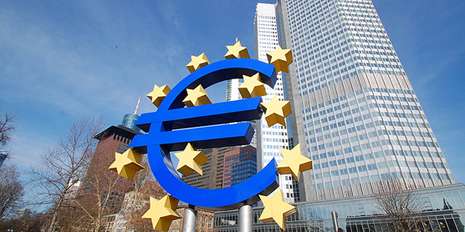The idea of a European industrial policy has been back on the agenda at least since the release of a Franco-German manifesto on the issue in early 2019. But whereas that document focused primarily on global competitiveness, an equally strong argument for reviving industrial policy is that it is necessary for the survival of the euro.
Since the introduction of the single currency, the industrial share of the economy in terms of value added has remained stable in Germany while declining markedly in France, Spain, and Italy. Germany’s massive economic-policy response to the COVID-19 shock is bound to reinforce this tendency.
Industry, broadly construed to include digital services, is the key to increasing productivity, implying that the European Union’s southern members will need to embark upon an industrial revival. Otherwise, their relative lack of competitiveness will deepen imbalances within the eurozone, and raise the prospect of permanent north-to-south transfers, threatening the bloc’s political sustainability.
The bad news is that while France can perhaps afford to spend billions of euros supporting its auto industry, Italy and Spain cannot. The good news is that the recently adopted Next Generation EU recovery package offers an opportunity both to revive southern European industry and position it for a digital, sustainable future.
According to the EU Council’s agreement this past July, “Member States shall prepare national recovery and resilience plans setting out the reform and investment agenda of the Member State concerned for the years 2021-23.” But EU leaders should now go further, by establishing clear goals for making European industry not just globally competitive but also more geographically balanced. The focus should be on the same key sectors identified in the Franco-German manifesto: health, energy, climate, security, and digital technology, with specific initiatives in microelectronics, batteries, and artificial intelligence (AI).
While the United States and China each race ahead in pursuit of global dominance in AI and other cutting-edge technologies, Europe is increasingly lagging behind in the digital economy. Even in successful Germany, total stock-market capitalization is less than that of a single US tech giant like Amazon, Apple, or Microsoft.
Contrary to what some commentators have argued, Europe’s lack of technological competitiveness is not the result of EU competition policy, which has blocked such mergers as the one between Alstom and Siemens. Rather, Europe’s problem is that it has a deeply fragmented digital market, which makes it impossible for firms to profit from the dynamic economies of scale that digital platforms and Big Data would otherwise offer. This obstacle leaves few incentives to invest in the research and development that drives innovation.
Making matters worse, Europe also has deeply fragmented public procurement policies, owing largely to the fact that it lacks a joint defense policy. It is this fragmentation, not competition within the single market, that explains the absence of European “champions.”
In the past, European industrial policy decayed after the strategy of picking winners failed in the 1980s and 1990s. Policymakers shifted their focus to fostering innovation, training the workforce, and providing an attractive business environment. Then, the 2008 global financial crisis renewed interest in industrial policy, and now the COVID-19 pandemic has underscored its potential advantages as a means of driving competition, advancing sustainability objectives, securing supply chains, and increasing economic resilience.
The pandemic has made technological sovereignty and value-chain stability leading priorities, not just in Europe but everywhere. Both imperatives feature prominently in US Democratic presidential contender Joe Biden’s economic-policy platform, and there is every reason to believe that the operations of foreign state-controlled firms – particularly Chinese companies – will be closely monitored both in the US and in Europe in the years ahead.
Moreover, industrial policy has a crucial role to play in moving resources from declining and obsolete sectors to emerging, viable ones. Without a strategic approach, state aid to the private sector will merely create more zombie firms that should have failed. This danger is particularly acute in the current circumstances, given the scale of emergency spending by governments. In pursuing a post-pandemic recovery, the goal of Next Generation EU and other programs should be not just to restore growth but also to transform the economy.
To that end, industrial policies should be used to help coordinate investments. Key industries like electric vehicles depend not just on the automotive sector but also on domains ranging from AI and 5G to battery manufacturing and infrastructure (charging stations). Achieving global competitiveness in this industry thus requires wide-ranging complementary investments, not to mention a properly trained and educated workforce. In Europe’s case, a traditional laissez-faire approach will have little to recommend it. Public-private cooperation will be necessary.
The success of the EU recovery fund depends on coordination at the European level, following a process of careful selection and monitoring of public spending. To prevent pork barrel politics from limiting the transformational potential of the recovery, candidate projects should be evaluated and shaped by independent national agencies staffed by recognized professionals.
The eurozone needs an industrial policy that preserves internal competition while also bolstering southern European industry and upholding the EU’s commitment to open markets internationally. Otherwise, the euro itself will remain at risk.
Xavier Vives, Professor of Economics and Finance at IESE Business School, is co-author (with Elena Carletti, Stijn Claessens, and Antonio Fatás) of the report The Bank Business Model in the Post-Covid-19 World.
Read the original article on project-syndicate.org.
More about: euro
















































